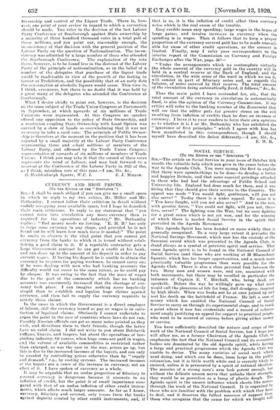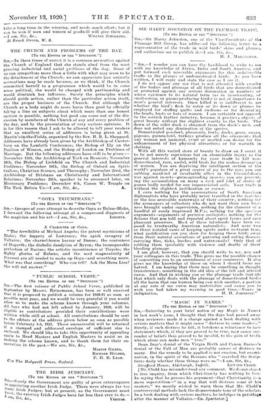SOCIAL SERVICE.
ho SHE EDITOR Or TIDS " SPEDIVIOR."] SIR,—The article on Social Service in your issue of October 16th recalls the valuable help which you gave in the years before the war to the Agenda Club. You were among the first to explain that there were agenda-things to be done--to develop a better and happier Britain, and that some especial privilege attached to those who had had the advantage of Public School and University life. England had done much for them, and it was fitting that they should give their service to the Country. The appeal was made "You would fight, gentlemen, will you not also serve?" To-day there is a wider appeal. To some it is "You have fought, will you not also serve?" And to the rest, with greater force, "You could not fight, will you not, there- fore, serve?" The fighting won the War, but we were fighting for a great cause which is not yet won, and for the winning of which there is needed Social Service in the spirit that prevailed in the Agenda Movement.
This Agenda Spirit has been handed en more widely than is generally recognized. To it very large extent it pervades the National Savings Movement, which now has the custody of the Samurai sword which was presented to the Agenda Club, to eland always as a symbol of patriotic spirit and service. That same Agenda spirit is to be found in the National Council of Social Service (and those who are working at 93 Bloomsbury Square), which has far larger opportunitiea, and a much more Practically valuable programme than were possible for the Agenda Club. Thorn is also a close personal link between the two. Many men and women were, and are, associated with both movements, but there may he recalled in particular the influence of Captain E. V. Birchall, who, being dead, yet speaketh. Before the war he willingly gave up what most would call the pleasures of life for long, dull drudgery, inspired by high ideals. When war broke out he at once joined up ani met his death on the battlefield of France. lle left is sum of money which has enabled the National Council of Social Service to carry on through its experimental stage, and to reach a point where it now has credentials and a record of aichieve- meat amply justifying an appeal for support to practical people, who want to he assured of success before giving either money or service.
You have sufficiently described the nature and scope of the work of the National Council of Social Service, but I hope Sell will allow me, as a former Chairman of the Agenda Club, to emphasize the fact that the National Council and its associated bodies are dominated by the old Agenda spirit, while having a large and practical programme which the Agenda Club ‘r.aa unable to devise. The many varieties of social work which need doing, and which can be done, loom large in the public estimation, but it is little worth while and is scarcely likely to succeed, unless it is permeated by a spirit of rational idealisni. The muscles of a strong man's arm look potent enough, be without the delicate unseen nerve that unlocks their strength. they would be as powerless as a lump of plastic dough. The Agenda spirit is the unseen influence which shoots like !ler"' through the work of the National Council. It is organized by those who are familiar with the problem with which they haw to deal, and it deserves the fullest measure of support front those who recognize that the cause for which we fought mill
take a long time in the winning, and needs much alert; but it can be won if men anti women of goodwill will give their aid.







































 Previous page
Previous page